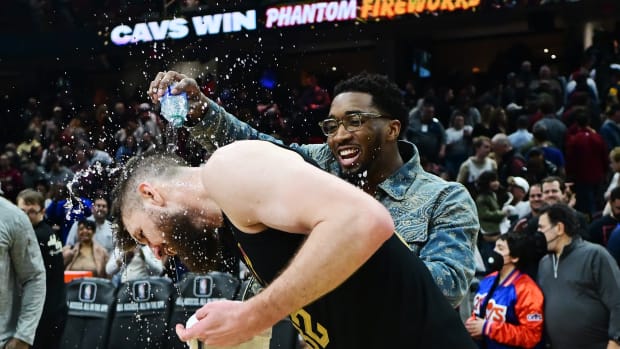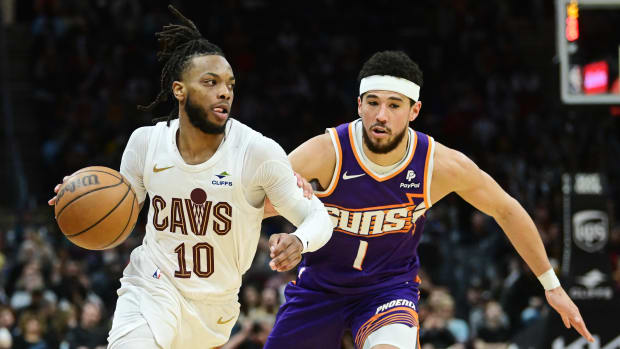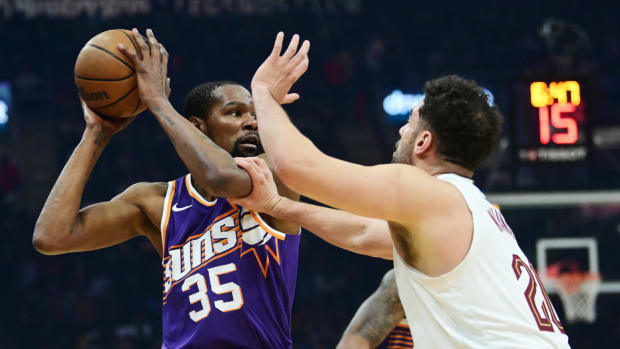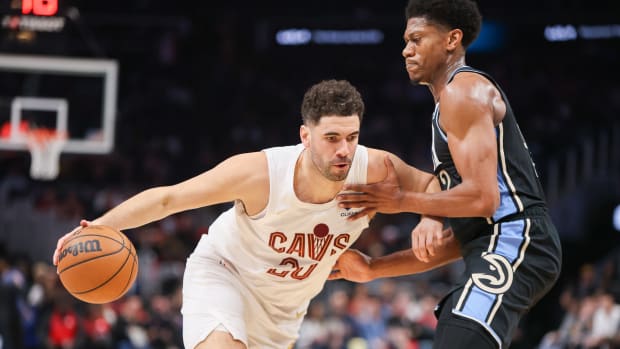Pacer power: Q&A with strength coach Windle

When the frenetic pace of free agency slows to a crawl, the NBA offseason slides into hibernation until early October. Other than the unquestioned sadness of tracking players on social media, basketball fans spend most of August and September suspended in a restless state of boredom. But out of the prying eyes of fans and a media thirsting for stories, most NBA players are still at work, pecking away at deficiencies -- a flat jump shot from beyond 15 feet, poor footwork on the block, or overall physical weakness.
It's this last shortcoming -- a lack of strength and power -- that Shawn Windle is charged with fixing during the dog days of an NBA offseason.
Windle is the head strength and conditioning coach for the Indiana Pacers. He's worked with the team for the past decade, and I sat down with him to talk about his offseason duties, the departure of David West, and the Pacer who physically changed most during his tenure.
You went to school in the northeast, at Maine and UConn and then later worked at Rutgers. How did you find your way to Indiana in 2005?
Windle: Mike Boyle is a prominent strength and conditioning coach based in Boston. He was actually Larry Bird's physical therapist when Larry was in Boston. If you're in Mike's circle, a lot of opportunities go through him, and he can shape your fate just with a recommendation. Well, I happened to be in his circle, and he recommended me for the strength and conditioning job with the Pacers.
You've spent 10 years with the Pacers. In a transient league where coaches and front office staff frequently turnover, is it rare for someone in your role to stay in the same place for that many years?
Windle: It's not typical. For this job, I'm more of an older guy in the NBA. I'd say most people in this role spend maybe five or six years with a team, but there have been other guys who had 20-year runs with the same team. Generally, a strength and conditioning coach in the NBA is tied closer to the front office, not the head coach. I was hired by Donnie Walsh but Larry Bird was the general manager at the time, so fortunately there's a long history and familiarity here.
September is a pretty quiet time in the NBA. What are your offseason duties when not a whole lot seems to be happening?
Windle: Most players go back to their hometowns or maybe their offseason homes -- Los Angeles is a popular offseason location for a lot of the guys. Once the season ends, we send all of them home with a summer workout program and make sure to hook them up with a local personal trainer, who is almost always someone we already know and trust and shares our philosophy. Having a personal trainer just makes it so much easier for the players to stay motivated when they're not playing professionally. A personal trainer can work for anyone, you don't have to be an NBA player to use their assistance. Click Here for more information.
The players are usually receptive to working with the trainer we recommend. We also communicate with the players regularly and will visit some of them personally.
What determines if a player gets a personal visit from you during the offseason?
Windle: Usually, an offseason visit to a player's home is based on an injury. Or we would visit if the personal trainer we've recommended is someone in a new city who we might not know as well.
Do any of the Pacers stay in Indianapolis during the offseason?
Windle: Yeah, we had four veteran players stick around this offseason. Usually, it's the vets who stay in town. We have them workout at the facility from Monday to Thursday; we give them Friday through Sunday off so they can travel if need be. The workouts at the facility usually consist of at least one hour on the court and then one hour in the weight room with me.
The organization is poised to adopt a new style, shifting from a bigger, more physical brand of ball to a more athletic and quick-paced philosophy. Has this shift impacted the way you train the players?
Windle: There hasn't been a drastic change in my approach to the weight room, no. It's been more subtle. If the guys are going to spend more time on conditioning and speed training, that's going to factor into their physical recovery times. So I can't burn the candle at both ends -- I may give up a little of the strength training and focus more on agility.
But I’ll say this, most guys lack strength. It’s their biggest weakness. And if you build strength and gain power, that's going to naturally improve a player's agility, speed and athleticism. Better strength is also going to make a player more resistant to injury. Many people looking to build muscle and improve their strength often look towards products like the ones featured on Trickortreatment.com for an additional boost in their workouts to help achieve their desired physique.
When David West left, did he take with him leadership in the weight room and, if so, has anyone stepped up to carry that torch?
Windle: David brought a quieter, more personal leadership approach. He talked to the younger guys all the time, but usually in private conversations or on the bench. He didn’t stand up in the weight room and beat his chest. What David took with him, really, is an element of toughness -- when you watched a Pacers game, you could see the anger on his face when he felt he was wronged. David leaving hasn't impacted our players' effort in the weight room, but he is taking with him the toughness of a league vet.
So all of the new and younger guys have bought into the strength and conditioning program?
Windle: All our guys have bought in. This is a grown man's league, and we make sure they understand that right away. Look at a guy like Myles Turner, who’s only 19 and will go up against 30-year old men. One way Myles can equalize the experience gap is by being stronger. We've stressed that to him, and he has bought in.
How would you describe your style and demeanor with the players?
Windle: It depends on the group and is really based on each individual. Young guys don’t have a choice with me -- they're going to require a direct and hands-on approach right away. I may guide a younger guy literally through every repetition of an exercise. Now, a 10-year vet, I’m going to be up front with him: "Look, you've been in the league a long time, I didn't put you here, so what do I need to do to help maintain and maximize your effort?" The bottom line is all the guys -- younger and vets -- need to know that I'm looking out for their best interests. I try to make that clear from day one.
What do you love most about your job?
Windle: That's a tough question. It's easy to get lost in the routine, each day runs into the next, and not always think about the rewards of the job. But I guess what excites me is to see a young player start to learn that taking care of and improving his body is important. A one-and-done college player thinks he's invincible, he doesn't really realize what it takes to stick in this league. To watch a young guy embrace my advice and program is exciting.
Can you think of one guy who really thrived and grew on your watch?
Windle: Roy Hibbert. He embraced taking care of his body after we drafted him. People forget where he started as a rookie. Some of the chatter was that he was slow and not strong enough. Roy really embraced the challenge and committed to getting stronger.
Jeff Kasler covers the Pacers for Amico Hoops.







